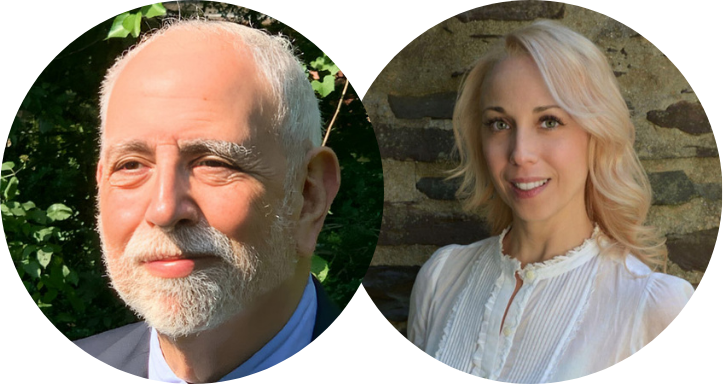MDLPA: Mental Disability Issues in Juvenile and Family Law
Presented by: Michael Perlin, JD and Heather Ellis Cucolo, JD
 This on-demand professional training program on Mental Disability Issues in Juvenile and Family Law is presented by Michael L. Perlin, JD, and Heather Ellis Cucolo, JD, in partnership with Mental Disability Law and Policy Associates (MDLPA). This badge-earning program can be shared digitally on platforms like LinkedIn or your resume and counts towards a certificate. Enroll in this program to earn credit towards Mental Disability Law Certificate and share your new digital credentials with prospective employers and colleagues.
This on-demand professional training program on Mental Disability Issues in Juvenile and Family Law is presented by Michael L. Perlin, JD, and Heather Ellis Cucolo, JD, in partnership with Mental Disability Law and Policy Associates (MDLPA). This badge-earning program can be shared digitally on platforms like LinkedIn or your resume and counts towards a certificate. Enroll in this program to earn credit towards Mental Disability Law Certificate and share your new digital credentials with prospective employers and colleagues.
This program focuses on four critical topics. First, learning why these issues are so essential for mental health professionals, advocates, lawyers and mediators whose work touches on any aspect of the family law system; Second, considering the full range of issues related to custody (including issues specifically related to children with special needs), adoption, marriage dissolution, foster care, and domestic abuse and guardianships as they relate to persons with mental disabilities, including the unique issues related to the role and scope of expert testimony; Third, considering the full range of special topics related to juvenile commitments to psychiatric institutions, matters related to the criminal trials of juveniles with mental disabilities (including, but not limited to questions of competency and waiver), correctional facilities in which juveniles are housed, the role of problem-solving courts, and the application of international human rights principles to this area of the law; and Forth, understand why it is vital to consider the role of sanism and pretextuality in all aspects of this system, and the application of therapeutic jurisprudence to all questions.
Upon completion of this training, participants will be able to:
Key topics covered in this training include:
Special issues related to juvenile commitments to psychiatric institutions
Criminal trials of juveniles with mental disabilities
Competency
Role of sanism and pretextuality
Application of therapeutic jurisprudence
Forensic and clinical mental health professionals
Guardianship cases
Psychiatric commitment of Juveniles.


We are proud to partner with Mental Disability Law and Policy Associates, LLC for this training. MDLPA is a boutique educational training company that offers specialized mental disability law consulting, the creation or enhancement of distance learning programs, in-house or online courses, and day or weekend training seminars to reputable organizations, educational institutions, professional groups, and advocacy groups focused on providing advanced knowledge and skills to persons working with marginalized populations.
Palo Alto University, Continuing & Professional Studies (CONCEPT) is approved by, recognized by, or maintains sponsorship provider status with the following boards and agencies. We maintain responsibility for all content in our CE/CPD programs. For more information, visit here.
American Psychological Association (APA): Approved sponsor of continuing education for psychologists.
Association of Social Work Boards (ASWB): Approved continuing education provider (ACE program, Provider #1480), 11/22/2023–11/22/2026.
Canadian Psychological Association (CPA): Approved to sponsor continuing education for psychologists.
National Board for Certified Counselors (NBCC): Approved Continuing Education Provider (ACEP No. 7190).
Palo Alto University, Continuing and Professional Studies (CONCEPT) is approved by the American Psychological Association to sponsor continuing education for psychologists. Palo Alto University, Continuing and Professional Studies (CONCEPT) maintains responsibility for this program and its content. Palo Alto University, Continuing and Professional Studies (CONCEPT), is approved by the Canadian Psychological Association to offer continuing education for psychologists. Palo Alto University, Continuing and Professional Studies (CONCEPT), SW CPE is recognized by the New York State Education Department’s State Board for Social Work as an approved provider of continuing education for licensed social workers #SW-0356 and the New York State Education Department’s State Board for Mental Health Practitioners as an approved provider of continuing education for licensed mental health counselors. #MHC-0073. Palo Alto University, Continuing and Professional Studies (CONCEPT) has been approved by NBCC as an Approved Continuing Education Provider, ACEP No. 6811. Programs that do not qualify for NBCC credit are clearly identified. CONCEPT Professional Training, #1480, is approved to offer social work continuing education by the Association of Social Work Boards (ASWB) Approved Continuing Education (ACE) program. Organizations, not individual courses, are approved as ACE providers. State and provincial regulatory boards have the final authority to determine whether an individual course may be accepted for continuing education credit. CONCEPT Professional Training maintains responsibility for this course. ACE provider approval period: 11/22/23-11/22/26. Social workers completing this course receive (clinical or social work ethics) continuing education credits.